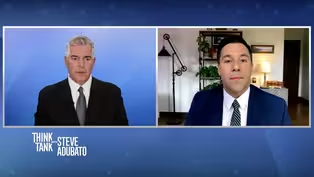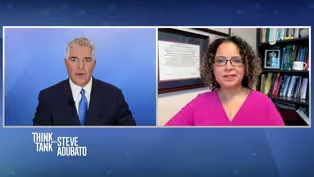
Creating advocacy surrounding distracted & reckless driving
Clip: 5/24/2025 | 7m 58sVideo has Closed Captions
Creating advocacy surrounding distracted & reckless driving
Steve Adubato sits down with Kate O’Connor, MPH, CHES, Director of Public Health & Safety at Brain Injury Alliance, to explore how student-led campaigns are creating advocacy and education to prevent brain injuries from distracted driving.
Problems playing video? | Closed Captioning Feedback
Problems playing video? | Closed Captioning Feedback
Think Tank with Steve Adubato is a local public television program presented by NJ PBS

Creating advocacy surrounding distracted & reckless driving
Clip: 5/24/2025 | 7m 58sVideo has Closed Captions
Steve Adubato sits down with Kate O’Connor, MPH, CHES, Director of Public Health & Safety at Brain Injury Alliance, to explore how student-led campaigns are creating advocacy and education to prevent brain injuries from distracted driving.
Problems playing video? | Closed Captioning Feedback
How to Watch Think Tank with Steve Adubato
Think Tank with Steve Adubato is available to stream on pbs.org and the free PBS App, available on iPhone, Apple TV, Android TV, Android smartphones, Amazon Fire TV, Amazon Fire Tablet, Roku, Samsung Smart TV, and Vizio.
Providing Support for PBS.org
Learn Moreabout PBS online sponsorship- We're now joined by Kate O'Connor, who is the Director of Public Health and Safety at the Brain Injury Alliance of New Jersey.
Kate, good to have you with us.
- Thank you for having me.
- Website's up.
Describe the organization.
- The Brain Injury Alliance of New Jersey is a nonprofit organization that is dedicated to improving the quality of life for anyone who's impacted by a brain injury.
And we do this through providing support, advocacy and information, while also promoting brain injury prevention.
- This work is important professionally, but also personally for you.
Talk about the personal connection.
- Yes.
Deeply, deeply personal to me.
My brother, Jimmy, sustained a severe brain injury at the age of 25 in 2012.
He was in multiple rehab centers, essentially fighting for his life.
And this experience watching him go through, a pedestrian crash and a brain injury, kind of led me to find the Brain Injury Alliance, and then I've been working there the last seven years.
- Talk about the connection between traumatic brain injuries and driver safety.
- Yeah, a lot of people don't really think of that, you know, as a big connection, but in our field, it's something that we deal with every single day.
So, in New Jersey, we have a really high rate of people getting hit by cars, speeding, car crashes.
And some of the results of that are people who live with traumatic brain injuries as a result of these crashes.
So, we always say the the Brain Injury Alliance, that not everyone dies, right?
There's this whole world of people who are living in New Jersey with life-altering injuries because of a crash.
- You know, it's so interesting when you think about this, and we know the folks at NJM who have been very supportive of this initiative, and supporters of public broadcasting as well.
And one of the things that we've talked to about them, and we picked up in preparing for this interview, is you connect with young people in high school, but particularly these Champion Schools.
Who are these Champion Schools and how did they become Champions?
- So, the Champion School Program was developed in 2010.
And this all came about because we had focus groups with teenagers and we talked to them about safe driving.
And from those focus groups, we learned that teenagers don't want to hear the message from their parent, their teacher.
They want to hear it from their friends.
So, we put the power in their hands.
And we developed the "U Got Brains" Champion Schools Program.
- Hold on one sec.
"U Got Brains."
Tell everyone what that is.
- Yes, so "U Got Brains," it just what it sounds like, right?
You have the brains and the power to make decisions regarding safe driving, safe walking, safe biking.
So, we put the power in their hands to create campaigns.
- What kind of response have you seen?
- Huge.
This is our 15th year anniversary, so it's a very big year for us.
We have worked with well over 250 schools across the state.
Close to a million students we've estimated have been impacted just from the student body alone.
We work with private, public, technical high schools, and we've seen campaigns from everything from seatbelt safety, to distracted driving, impaired driving.
And the students really create such amazing, amazing campaigns to influence their peers.
- What progress are we making with texting and driving?
- Texting and driving is always evolving, especially with the technology that's in cars now and allows people to read texts, voice texts and all of that.
The numbers are still kind of going up with distracted driving.
And young driver crashes kind of ebbs and flows, but they've kind of stayed around the same.
A lot of our students do focus on distracted driving as part of their campaign.
And students are very honest about this.
They know that their friends are texting and driving.
They know that their friends are searching for new playlists.
They're Snapchatting, Instagramming, all of those things.
So, they know it's a problem and we're just trying to get ahead of it and talk to as many teens as we can.
- Talk about the college program.
- So, the college program was modeled after the "U Got Brains" Champion School Program.
We had this amazing program where we would talk to all these high schools and then we would kind of lose them right when they went to college.
- That's right.
- So in a very similar way, we are working with state colleges where we provide them with a stipend to create a transportation safety campaign on campus.
We call this campaign the "College Roads and Safety Habits," or CRASH Project, it's known as.
And very similarly, the students create whatever is important to them.
So, Rutgers University in New Brunswick last year focused on scooter safety because they have a high percentage of people running, you know, the e-scooters around campus.
Montclair State University this year was a first year school with us and they focused on pedestrian safety because it's a very walkable campus.
So, it's really up to them what they want, you know, to focus on.
- Kate, I'm curious about this.
I'm a student of leadership, and, obviously, you're identifying high school leaders, college leaders.
How do these leaders, how do you identify them?
How do you know who they are?
- So, for the high school, it's a little bit easier because we partner with the driver's ed classes oftentimes.
We don't have to.
It can be the football team if they want to do it.
But that's usually how the teachers help kind of select the students for the program.
The college program's different, right?
We don't have teachers guiding them.
This is all put onto the students.
So, we have outreach to the public health departments, criminal justice departments, speech pathology departments, and kind of see who's interested.
And then from there they develop their group.
- How rewarding is this work for you and your colleagues?
- Very much so.
I always say I can't imagine working in a field where I wasn't at least working towards a greater good of helping people and trying to save lives.
A lot of us who work at the Brain Injury Alliance, whether we have a personal experience ourselves or we've just become passionate through our work, it's more than just a job.
We really care about keeping people safe.
And I always joke that you're never not an advocate.
So you can begin, at the hairdresser and talking about this.
We advocate for safety all the time.
- You're always advocating?
- Yes, for sure.
- How receptive are most people?
- Transportation safety is one of those topics, it's unique in the sense that it affects everyone, right?
Everyone walks, bikes, drives, does something, but it's a topic that no one really talks about in the safety aspect, right?
We hear maybe "don't drink and drive," but most people aren't talked to about distracted driving, or using crosswalks, or riding their bike on their right.
So once you bring it up to them, everyone has a lot to say because they can relate.
- This is Kate O'Connor, Director of Public Health and Safety at the Brain Injury Alliance of New Jersey.
Kate, thank you so much for joining us.
- Thank you so much, Steve.
- You got it.
Stay with us, we'll be right back.
- [Narrator] Think Tank with Steve Adubato is a production of the Caucus Educational Corporation.
Funding has been provided by New Jersey’s Clean Energy program.
Wells Fargo.
Hackensack Meridian Health.
NJM Insurance Group.
PSEG Foundation.
The Port Authority of New York and New Jersey.
Delta Dental of New Jersey.
The Fidelco Group.
And by Newark Board of Education.
Promotional support provided by BestofNJ.com.
And by NJ.Com.
Hey, kids, PBS Kids and Delta Dental want you to have a healthy smile.
So here are some tips for you to remember.
Number one, eat plenty of crunchy fruits and vegetables.
Number two, brush your teeth after eating sugary snacks or drinking sodas.
And number three, drink lots of water to wash away food particles.
When your teeth are happy, all of you is happy.
From PBS Kids and Delta Dental.
Have a healthy smile.
Conservation and the fight to protect clean waterways in NJ
Video has Closed Captions
Clip: 5/24/2025 | 9m 24s | Conservation and the fight to protect clean waterways in NJ (9m 24s)
The rising confusion and resistance towards vaccines
Video has Closed Captions
Clip: 5/24/2025 | 9m 33s | The rising confusion and resistance towards vaccines (9m 33s)
Providing Support for PBS.org
Learn Moreabout PBS online sponsorship
- News and Public Affairs

Top journalists deliver compelling original analysis of the hour's headlines.

- News and Public Affairs

FRONTLINE is investigative journalism that questions, explains and changes our world.












Support for PBS provided by:
Think Tank with Steve Adubato is a local public television program presented by NJ PBS

